
Key Highlights
Key Highlights:
Diabetes self-management education is important in helping people with diabetes get better care and feel better. National standards say that ongoing support and teaching are needed, as the ADA advises. A few big parts of this include checking blood glucose, planning what you eat, and managing your medicine the right way. There are new rules for 2025 with changes that help the way providers and patients talk with each other and how care is given. It is very important to get past common barriers, like handling feelings and knowing how to use health services. Teaching patients and giving them more control helps them handle their diabetes, feel better, and have a good quality of life.
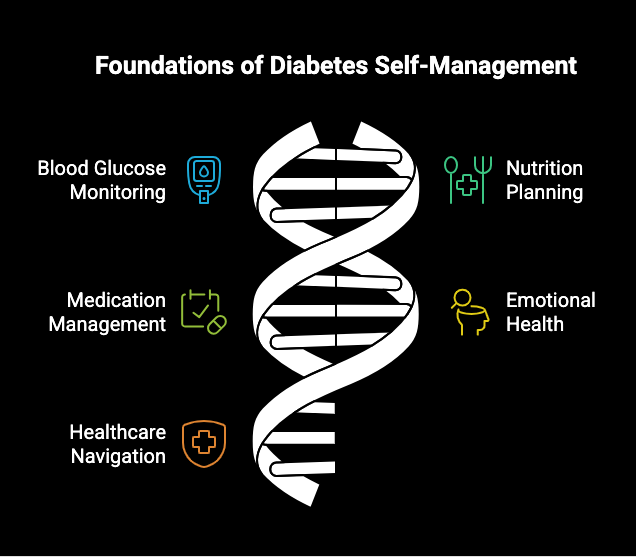
Mastering Diabetes Self-Management: A Comprehensive Guide
Diabetes can be a hard disease to deal with, but you need to know how to take care of yourself if you have it. You have to keep learning and take action each day. It is important to understand the basics to help keep your diabetes under control. Here, we talk about the most important parts you should focus on for good diabetes self-management. We will cover the main steps for a healthy life if you have diabetes.
The Importance of Self-Management
Managing diabetes the right way can feel hard, but with good steps and help, you can still live well. I have worked with this for over 27 years, and I have seen more than 10,000 patients. From this, I know that knowing what is going on and making healthy choices every day is what really helps. When you know this, the path to learning about yourself and staying on track begins.
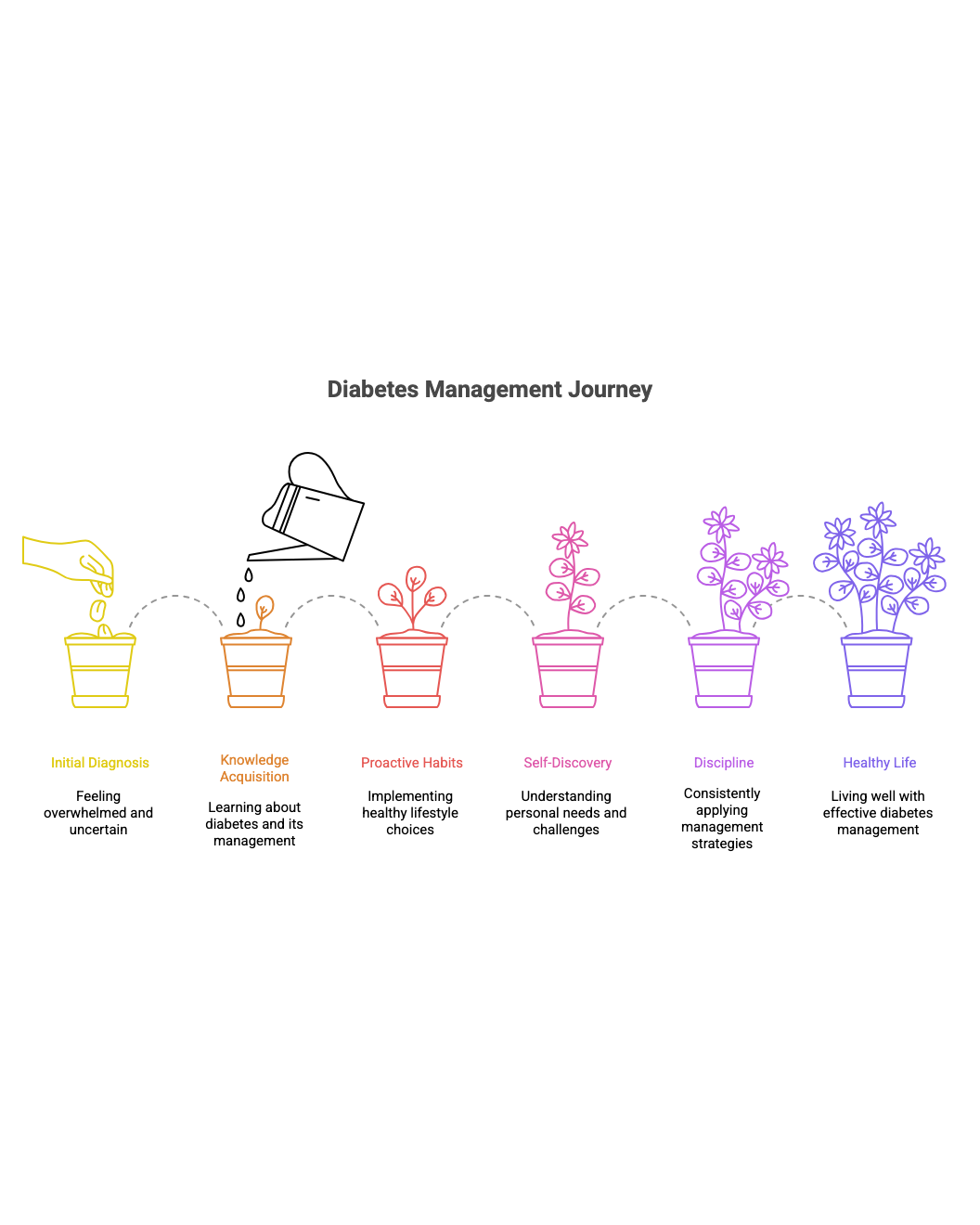
Pillar 1: Healthy Coping
Diabetes is something that needs you to stay on top of things all the time. You have to work at it every day and be strong. It’s important for people to know that living with diabetes can be tough, and it can feel like a lot to handle. The stress and feelings that come with the diagnosis are real. A good way to deal with it is to accept diabetes and know what you are facing. When you look at what you are up against, you can start to see being diagnosed with diabetes as a chance. You can use this time to make better choices for your life, feel better, and take care of yourself in new ways.
Pillar 2: Healthy Eating
Diet is very important for diabetes management. You need to know what is in your food, like carbohydrates, fats, proteins, fiber, minerals, water, and vitamins. A balanced diet should have a lot of non-starchy vegetables, lean proteins, and complex carbohydrates. Try to eat natural foods that are not much processed. Learning about the glycemic index can also help you keep your blood sugar at a good level.
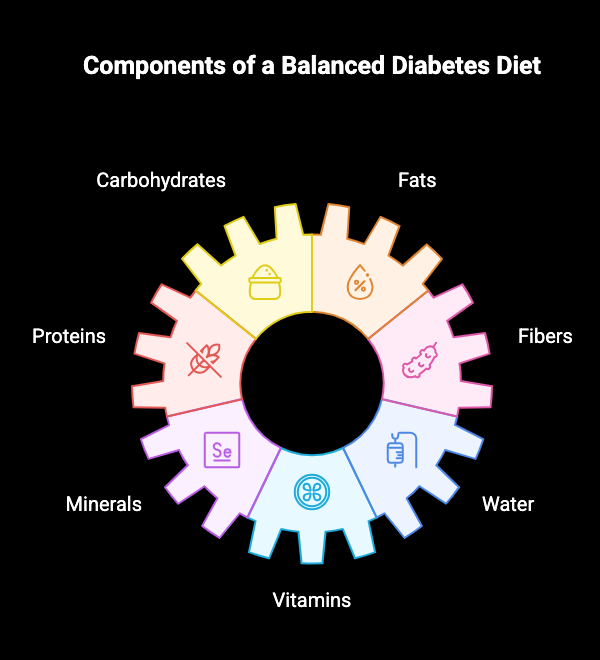
Pillar 3: Being Active
Regular physical activity is very important. You should try to get at least 150 minutes of moderate exercise every week. Walking, lifting weights, and moving around after you eat help control blood sugar. These things also make your health better overall.
Pillar 4: Taking Medications
Taking your medicine the right way is important. You should always work with your doctor or nurse to understand your medicines. Talk to them if you feel any side effects. It is good to take your medicine at the same time every day. This helps you avoid any problems with your health.
Pillar 5: Monitoring
Seeing the doctor regularly and getting check-ups can help you avoid problems with your health, especially related to diabetes mellitus. You should watch important things like your A1C level, blood sugar, blood pressure, cholesterol, and how your kidneys are doing. If the doctor finds something early, it can stop bigger health problems from happening later.
Pillar 6: Reducing Risks – The GLUCOSE Acronym
The word GLUCOSE is used to help people remember steps for taking care of diabetes.
- G for Glucose management
- L for Lipid (cholesterol) profiles
- U for Urine tests
- C is about stopping cigarettes and having regular eye checks
- O means eye exams
- S is about not smoking
- E is for caring for your feet and hands and making sure to get your blood pressure checked often
Pillar 7: Problem Solving
Strong problem-solving skills are very important in diabetes care. A person needs to know what to eat and also how to handle stress. You have to be ready for life’s challenges. Having a good support system helps a lot. Learning more about diabetes care also makes a big difference. If you get the right help and tools, outcomes be better.
Addressing Gaps in Diabetes Care
Comprehensive management of chronic illness is not just about what one person does. The way healthcare is given, insurance options, and technology all play a part in how patients do. To take care of diabetes well, people have to know about all parts of life. This means looking at the physical, emotional, thinking, and social sides of a person. A good approach to diabetes care needs to include these areas.
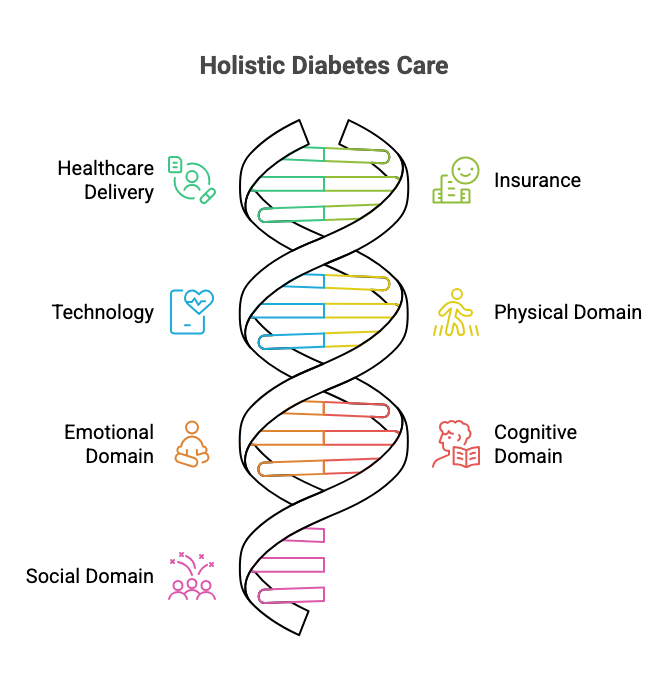
The Role of Healthcare Systems & Social Support
Our healthcare system in the United States has an important part to play. It needs to focus on keeping people healthy, not just treating illness when it happens. At the same time, government rules and plans should help people eat better and take steps to not get sick in the first place. When everyone works together, the way we handle and stop health problems gets better.
Summary & Key Takeaways
The seven pillars of diabetes self-management are healthy coping, eating, staying active, taking your medicine, checking your levels, lowering risks, and solving problems. These steps are the backbone of good care. A solid support system will help you manage the many challenges of diabetes. This guide can make it easier to handle your daily life with diabetes.
Thank you for taking the time to read about these principles. We hope this guide will be a helpful resource for you in your diabetes management, particularly regarding cardiovascular risk factors. If you want more simple and useful tips, please check out our next posts at KundlasMD.
To access diabetes self-management education and support resources, consider reaching out to your healthcare provider, local clinics, or diabetes education programs in your community. Many hospitals and diabetes centers offer classes or one-on-one sessions, and there are also reputable online resources and organizations that provide education and ongoing support.
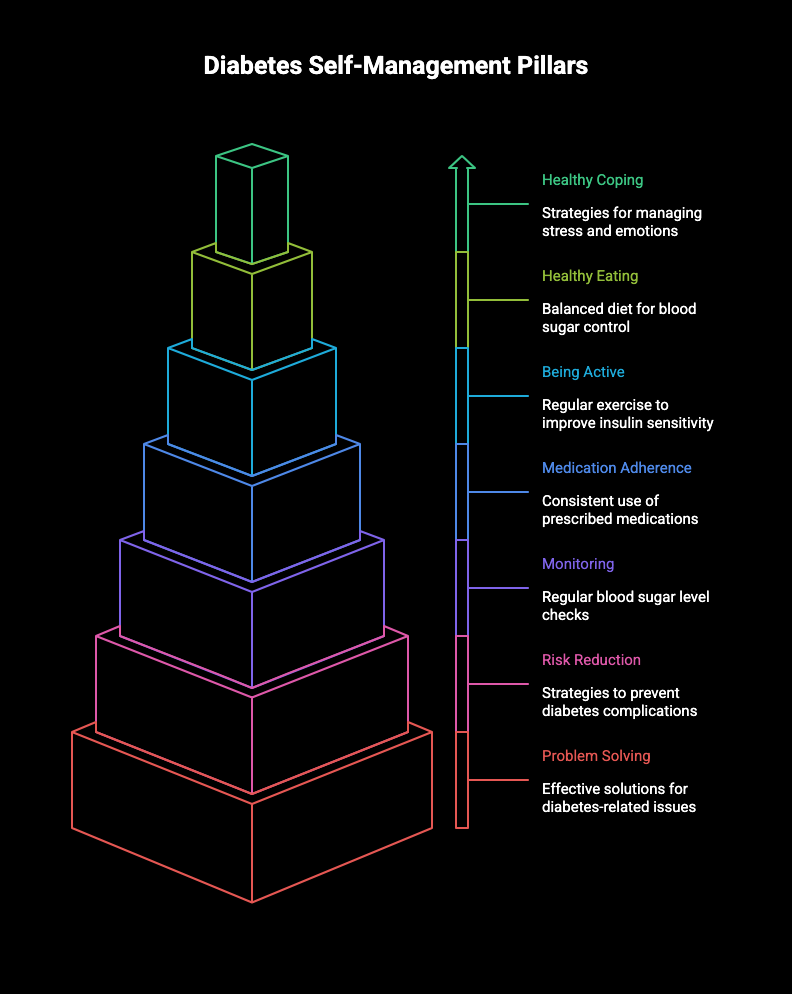
Conclusion
The way people manage diabetes is based on DSMES 2025. The main things to focus on are ongoing education, helpful resources, and care plans that fit each person. This plan helps people feel better and live a good life. Being part of a community and working with a healthcare team, including a diabetes care team, makes it easier to change habits and get better diabetes outcomes. Using the latest advice from the American Diabetes Association can help people get the support they need. With ongoing education and resources, people can feel in control of their diabetes and have a better health status. Good support leads to better quality of life for anyone with diabetes.
Frequently Asked Questions
Who Should Start DSMES and When Is the Best Time?
People who have just found out that they have diabetes, those who have trouble taking care of it, or those having problems from it should start DSMES. It is best to begin this soon after you get the diagnosis or if life changes in a big way. This helps you get support and know what to do at the right time. Starting early can help you handle the condition better and get good health outcomes.
How Does DSMES Enhance Day-to-Day Diabetes Control?
Diabetes Self-Management Education and Support (DSMES) helps you control diabetes each day. It does this by helping you set your own goals, watch your progress, and learn the right skills to manage this chronic disease. These steps give people the power to take care of their health. As a result, they are more likely to follow healthy habits and see better health outcomes for themselves.
What Sets DSMES Apart From Other Diabetes Education Programs?
Diabetes Self-Management Education and Support (DSMES) gives you advice and help that fits your needs. The program offers ongoing support and shows you ways to change your habits. DSMES is not like general diabetes education. It makes sure that you feel confident and have the right tools for your life. The support is personal and focuses on what you need so you can get better health outcomes and improve clinical outcomes. DSMES helps you with diabetes education, behavior change, and ongoing support so you feel ready to manage your health.


